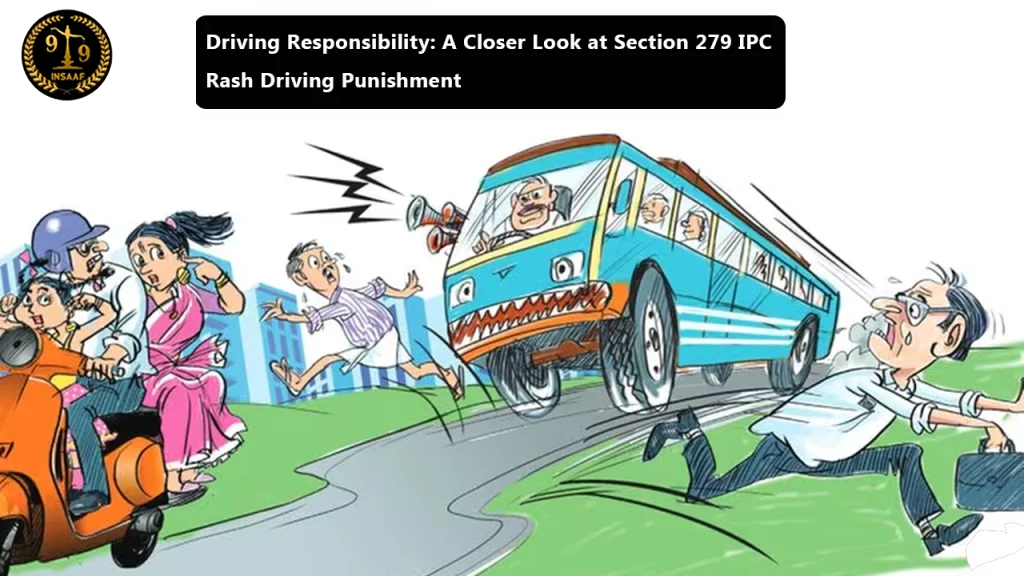

Online Legal Advice from Insaaf99® Online Lawyer Consultation in India


Online Legal Advice from Insaaf99® Online Lawyer Consultation in India

In India's legal world, think of Section 279 of the Indian Penal Code (IPC) as a protector against reckless driving. This important rule is there to deal with the serious outcomes of irresponsible behavior on the roads. In simple terms, we're here to break down what Section 279 IPC means and what penalties you might face if you're caught driving recklessly. So, let's dive into it in an easy-to-understand way.
Section 279 of the IPC deals with the act of driving or riding recklessly on a public road. According to this rule, anyone driving a vehicle in a way that is rash or negligent, posing a danger to human life or likely to cause harm to others, can be punished. The punishment may include imprisonment for up to six months, a fine that can go up to one thousand rupees, or both.
Understanding the severity of the offense requires a closer look at the fundamental aspects embedded in Section 279 IPC:
Vehicle Operation: This rule applies to anyone driving a vehicle on a public road, encompassing various types of vehicles, from motorized four-wheelers to two-wheeled bikes.
Rash or Negligent Driving: The crux of the offense lies in how the vehicle is driven. Rash or negligent driving implies a deliberate and reckless disregard for the safety of others on the road, going beyond simple oversight.
Endangering Human Life: The behavior must go beyond a mere violation of traffic rules; it should present a direct threat to human life. The level of danger involved is crucial in establishing guilt.
Even if no actual harm occurs, the law acknowledges the potential for harm. If the driving behavior is likely to cause hurt or injury to any person, it falls under the purview of Section 279 IPC.
The legal ramifications for breaching Section 279 of the Indian Penal Code (IPC) are robust, reflecting the seriousness of jeopardizing public safety. Perpetrators may be subject to imprisonment for a duration of up to six months, a monetary fine that can reach one thousand rupees, or both. The stringent nature of the penalties serves as a deterrent, aiming to discourage instances of negligent and reckless driving, highlighting the government's dedication to ensuring road safety.
Operating a motor vehicle under the influence of alcohol or other intoxicants is a grave offense that poses a significant threat to public safety. In India, causing the death of another person while driving under the influence of intoxicants is considered culpable homicide under Section 304A of the Indian Penal Code (IPC).
Section 279 of the IPC specifically addresses negligent and reckless driving on public roads, including cases of driving under the influence. If such behavior leads to harm, additional charges may apply under Sections 337, 338, and 304A of the IPC, addressing offenses related to endangering human life and culpable homicide. The legal consequences underscore the gravity of impaired driving, emphasizing the need for responsible practices on the road.

While Section 279 IPC plays a pivotal role in addressing the menace of rash driving, its effective enforcement faces challenges. The burden of proof often rests on law enforcement agencies, requiring them to establish the accused's state of mind and the immediate risk posed to human life. Additionally, the lack of stringent penalties for repeat offenders and the delay in legal proceedings pose hurdles in achieving swift justice.
In the contemporary landscape, technology has emerged as a potent ally in enforcing Section 279 IPC. Surveillance cameras, dash cams, and other technological advancements provide valuable evidence in establishing the facts surrounding a rash driving incident. Leveraging technology not only aids law enforcement but also fosters a culture of accountability among drivers.
Section 279 of the Indian Penal Code stands as a guardian of public safety, holding individuals accountable for their actions on the road. By dissecting its elements and exploring its implications, we gain a comprehensive understanding of the legal ramifications of rash driving. As India continues its journey towards safer roads, the effective enforcement of Section 279 IPC remains instrumental in fostering a culture of responsible and conscientious driving.
Insaaf99, an innovative online legal consultation platform, is reshaping the landscape for individuals entangled in IPC 279 cases. Focused on rash driving offenses, Insaaf99 connects users with expert legal professionals, providing virtual consultations, case analysis, and clear legal guidance. Users can securely upload case documents for thorough examination, ensuring a comprehensive understanding of the complexities surrounding Section 279 of the Indian Penal Code. By breaking down geographical barriers, offering cost-effective services, and providing educational resources, Insaaf99 empowers individuals nationwide to navigate the legal intricacies of their cases with confidence and accessibility. This digital platform represents a transformative approach to legal advice in the ever-evolving realm of online legal services.